news
of Bible translation 2009
18.12.09
I Round
Table discussion about the New Testament in modern Chuvash
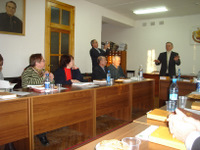 On
18 December 2009 a Round Table discussion took place at
the Chuvash Institute of Human Sciences in Cheboksary, capital
of Chuvashia. Participants included Chuvash writers, linguists,
journalists and historians and the topic was the New Testament
in modern Chuvash, just published by the Institute for Bible
Translation. The edition bears the imprint of the Russian
Academy of Sciences, which is a guarantee that the translation
is of good quality. On
18 December 2009 a Round Table discussion took place at
the Chuvash Institute of Human Sciences in Cheboksary, capital
of Chuvashia. Participants included Chuvash writers, linguists,
journalists and historians and the topic was the New Testament
in modern Chuvash, just published by the Institute for Bible
Translation. The edition bears the imprint of the Russian
Academy of Sciences, which is a guarantee that the translation
is of good quality.
The participants discussed questions with
regard to the accuracy of the translation, the problems
of biblical terms, and the possibility of using the Children’s
Bible (IBT, 2006) and the New Testament (IBT, 2009) in preparing
a Chuvash school curriculum in religion. A subject for discussion
was also the purpose of the new NT translation in Chuvash
in view of the already existing New Testament translated
by I. Yakovlev, and with the prospect of the full Bible
in Chuvash soon to be published by the Russian Bible Society.
This Bible will consist of a new Old Testament translation
and a revised version of Yakovlev's New Testament.
The participants of the meeting valued
the quality of the newly published translation, its natural
language, its faithfulness to the original and the fact
that it is easy to understand. The common view of the meeting
can be expressed in the words of one of the participants:
“Chuvash readers of the 21st century definitely need a new
translation of the New Testament, together with the existing
translation of I. Yakovlev and the full Bible which will
soon be ready... The new translation shows how the Chuvash
language has changed during the past one hundred years,
from the time when the first New Testament was published.
This is a testimony that the Chuvash language is developing
and that it will survive.”
17.12.09
I Second
edition of Short Dungan-Russian dictionary
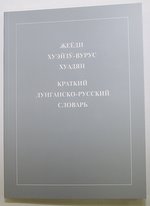 A
second improved and enlarged version of the Short Dungan-Russian
dictionary has been published with the participation and
assistance of the Institute for Bible Translation in Moscow.
The original dictionary was compiled by Yusup Yanshansin,
whose 100th birthday was recently celebrated in Bishkek.
The Short Dungan-Russian dictionary was the first example
of a bilingual dictionary for the Dungan language. The material
was taken from spoken and written sources, collected by
Yanshansin over many years. A
second improved and enlarged version of the Short Dungan-Russian
dictionary has been published with the participation and
assistance of the Institute for Bible Translation in Moscow.
The original dictionary was compiled by Yusup Yanshansin,
whose 100th birthday was recently celebrated in Bishkek.
The Short Dungan-Russian dictionary was the first example
of a bilingual dictionary for the Dungan language. The material
was taken from spoken and written sources, collected by
Yanshansin over many years.
Dungan is a dialect of the Chinese language.
At present the Central Asian countries are actively renewing
their contact with China, and consequently Chinese words
are being adopted into their languages. When this dictionary
was being prepared for the second edition several Chinese
words were included, as well as loan words from Arabic,
Iranian, Russian and Turkish, as a rather high percentage
of these are also used in modern Dungan.
The book bears the imprint of the Institute
of Historical and Cultural Research of the National Academy
of the Kyrgyz republic. It is aimed at students of the Russian
and Dungan languages.
10.12.09
I The
New Testament in modern Chuvash published
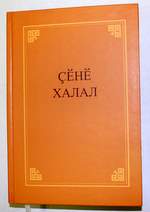 The
New Testament was first translated into Chuvash by I. Yakovlev
and published as early as 1911. This translation is still
used by the Orthodox church. In addition to this, IBT has
now published a translation of the New Testament in modern
Chuvash, mainly intended for home reading. The book contains
a glossary of key terms, maps and photographs of biblical
places. The publication bears the imprint of the Institute
of Linguistics of the Russian Academy of Sciences. The
New Testament was first translated into Chuvash by I. Yakovlev
and published as early as 1911. This translation is still
used by the Orthodox church. In addition to this, IBT has
now published a translation of the New Testament in modern
Chuvash, mainly intended for home reading. The book contains
a glossary of key terms, maps and photographs of biblical
places. The publication bears the imprint of the Institute
of Linguistics of the Russian Academy of Sciences.
The translation team consisted of a large
group of people, among them several well-known Chuvash authors
and poets, as well as exegetical advisors and translation
consultants from IBT and its partner organisations.
IBT Russia/CIS has earlier published two
books in Chuvash: the Four Gospels in 2001 and the Illustrated
Bible for Children in 2006. When these books were printed
presentations to the wider Chuvash society were organised
in co-operation with the Ministry of Culture. The feedback
which was received from both specialists and ordinary readers
of the books was taken into consideration in the work on
the new NT translation.
24.11.09 I Annual
Fellowship weekend
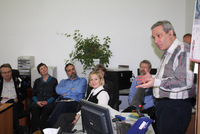 IBT's
annual International Fellowship weekend took place 21-24
November 2009 in Moscow. The event began on 21 November
with the traditional “Open Day”, when all the co-workers
of IBT Russia/CIS met with those who support their work.
This time we had the joy of welcoming representatives of
organisations from Denmark, Norway, England, Switzerland
and USA. We were also happy to have team members from the
Ossetic and Bashkir IBT's
annual International Fellowship weekend took place 21-24
November 2009 in Moscow. The event began on 21 November
with the traditional “Open Day”, when all the co-workers
of IBT Russia/CIS met with those who support their work.
This time we had the joy of welcoming representatives of
organisations from Denmark, Norway, England, Switzerland
and USA. We were also happy to have team members from the
Ossetic and Bashkir 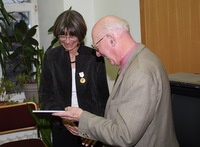 projects
present. With the goal of bringing the organisations into
closer contact with each other and with IBT Russia/CIS,
an International Association was formed and had its first
meeting on 22 November. projects
present. With the goal of bringing the organisations into
closer contact with each other and with IBT Russia/CIS,
an International Association was formed and had its first
meeting on 22 November.
During the Open Day a Festschrift in honour
of Marianne Beerle-Moor was presented to her. The title
is "The people understood the reading" and the
book contains nine articles written by IBT colleagues and
representatives of partner organisations. The editors are
David J. Clark and Andrei S. Desnitsky.
16.11.09
I IBT
Russia/CIS awarded a medal by the Kalmyk republic
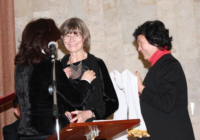 “Forever
together” is the inscription on the medal which IBT Russia/CIS
received on 16 November 2009 from the Kalmyk republic. The
words refer to the 400 years that the Kalmyk people have
lived in the Russian Federation, a jubilee which was celebrated
widely in Kalmykia during 2009. On the 16th-18th November
the anniversary celebrations moved to Moscow, where 400
Kalmyk artists and authors participated in concerts, exhibitions
and meetings with their Russian colleagues. “Forever
together” is the inscription on the medal which IBT Russia/CIS
received on 16 November 2009 from the Kalmyk republic. The
words refer to the 400 years that the Kalmyk people have
lived in the Russian Federation, a jubilee which was celebrated
widely in Kalmykia during 2009. On the 16th-18th November
the anniversary celebrations moved to Moscow, where 400
Kalmyk artists and authors participated in concerts, exhibitions
and meetings with their Russian colleagues.
The celebrations in Moscow began with a
meeting between Kalmyk and Russian writers, where the poet
Vera Shugraeva, IBT's translator of the New Testament and
Psalms into the Kalmyk language, was awarded an honorary
diploma by the Writers' union of the Russian Federation
“for her great contribution to modern multicultural literature
in Russia”. On the decree of the Kalmyk president, IBT Russia's
director Marianne Beerle-Moor was awarded a medal of the
Kalmyk republic for IBT's work on Bible translation into
the Kalmyk language.
06.10.09
I Training
course for new members of Bible translation teams
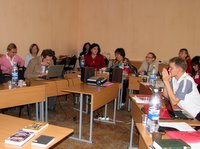 From 30 September to 6
October IBT held a training course for new team members: translators,
philological editors, exegetical advisors and field testers. All the
participants were professionals and specialists in their languages: Andi,
Dargin, Mari, Kumyk, Komi-Permyak, Kabardian, Lezgi and Tatar. Soon they will
be able to put into practice what they learnt in the field of Bible
translation. From 30 September to 6
October IBT held a training course for new team members: translators,
philological editors, exegetical advisors and field testers. All the
participants were professionals and specialists in their languages: Andi,
Dargin, Mari, Kumyk, Komi-Permyak, Kabardian, Lezgi and Tatar. Soon they will
be able to put into practice what they learnt in the field of Bible
translation.
The course was held within
the framework of IBT's educational program and experienced teachers from IBT,
the Institute of Linguistics
(Russian Academy of Sciences), and the college
“Legacy” lectured on a wide range of themes. The participants learnt about the
history of Bible translation and received elementary knowledge of the Bible and
the languages in which the books of the Old and New Testaments were written.
Introductions to the more important books of the Bible revealed the exegetical peculiarities
of these books, their structures and their literary genres. The participants
were also informed about the basic problems that a translator may encounter
when working on these books.
At
the end of the course the participants expressed their appreciation
for the understandable and consistent teaching and the interaction
between theory and practice. They found especially useful
the sessions in which translation theory was applied in
practice.
Next
IBT is planning a special course of introduction to the
Old Testament for experienced team members who are in the
process of working on the Old Testament and on the revision
of the New Testament.
09.09.09
I
Three
Old Testament books published in Crimean Tatar
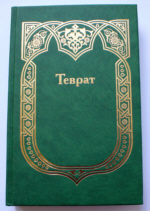 In
September 2009 IBT published ”Tevrat” in Crimean Tatar, an edition containing
three of the five books of Moses: Genesis, Exodus and Deuteronomy. At the
request of readers it was decided to publish these three books now, and not
wait for Leviticus and Numbers, which are in the process of being translated. In
September 2009 IBT published ”Tevrat” in Crimean Tatar, an edition containing
three of the five books of Moses: Genesis, Exodus and Deuteronomy. At the
request of readers it was decided to publish these three books now, and not
wait for Leviticus and Numbers, which are in the process of being translated.
The first attempt to
translate the Bible into Crimean Tatar took place during the period 1978-96. In 1999 a translation group was
established locally and since then several Bible books have been published
(“Stories of Jesus”, illustrated by a national artist, in 2002; a book on the
prophets in 2005; a revision of Matthew’s Gospel in 2006, a book containing
Proverbs and Ecclesiastes in 2007, and the Four Gospels and Acts
in 2008). The
work is done in cooperation with the Pioneer Bible Translators.
The Crimean Tatars
were allowed to return to Crimea in 1989, after having been deported to Central
Asia and other areas of the Soviet Union in
1944. Today
more than 250,000 Crimean Tatars are back in their homeland, struggling to
reestablish their lives and reclaim their national and cultural rights,
including the use of their language, against many social and economic
obstacles.
03.09.09
I
1-2
Kings
published in the Adygei language
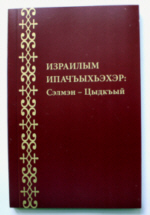 The Adygei (129,000) live in the Adygei
Republic of the Russian Federation, north-western Caucasus. They are mainly Sunni Muslims. The Adygei (129,000) live in the Adygei
Republic of the Russian Federation, north-western Caucasus. They are mainly Sunni Muslims.
1-2 Kings is the fifth separate book
from the Old Testament that IBT has published so far in Adygei - the first, 1-2
Samuel, was
published in 2002, Genesis in 2005,
a book containing Ruth, Esther and Jonah in 2006, and
the Psalms in 2007. The first New Testament in
Adygei was published as early as 1991.
The new edition contains
six illustrations, produced especially for this book by a well-known Adygei artist. The members of the translation team are continuing
their work on the Old Testament. “I want my people to read this wonderful book
and to get to know the goodness of God,” the translator has said. The work is
done in cooperation with SIL.
17.08.09
I
First
translation of Ruth, Esther and Jonah in Kurdish-Kurmanji
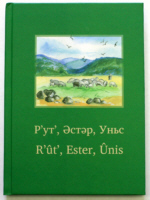 IBT has published
a new edition that includes the translation of Ruth, Esther and Jonah in the
Kurdish language. These translations come within the framework of preparations
to publish the complete Old Testament. The present edition will be distributed among
the Kurdish diaspora in Nizhniy Novgorod, Bataisk, Yaroslavl,
Krasnodar and other cities of Russia. IBT has published
a new edition that includes the translation of Ruth, Esther and Jonah in the
Kurdish language. These translations come within the framework of preparations
to publish the complete Old Testament. The present edition will be distributed among
the Kurdish diaspora in Nizhniy Novgorod, Bataisk, Yaroslavl,
Krasnodar and other cities of Russia.
The New Testament in Kurdish was
published by IBT in 2000. We received favourable reviews from readers and heard
that it was also being used for learning their native language. Kurds have
difficulty in becoming literate in their language
because it is not taught in Russia
or Armenia.
The Kurdish people
are an ancient people of south-west Asia. They
have no administrative territory of their own and most live in Iran, Iraq,
Syria and Turkey.
Substantial Kurdish communities can also be found in Lebanon,
Armenia, Azerbaijan and Russia. There are approximately 25-30
million Kurds in the world. They speak Kurdish, which belongs to the Iranian
branch of Indo-European languages.
One of the
major dialect groups in Kurdish is Kurmanji. This is spoken by the Kurds living
in Iraq, Syria, Turkey,
Russia
and other former Soviet republics. Approximately 50,000 Kurmanji-speaking Kurds
live in Russia.
Historically the
Kurds used Arabic script, still employed in Iran
and Iraq.
In the 1920s - 1930s Latin scripts were developed for Kurds in Turkey and the USSR. Then in 1946 the Soviet Kurds
were made to use Cyrillic, which is still used in Russia
and Armenia,
whereas Kurds living in other former Soviet republics have returned to Latin
script.
The Kurmanji
consider themselves descendants of the Midians (Midians were descendants of
Abraham and his second wife Keturah. When Moses fled from Egypt into Midian
he married a Midian).
At the
beginning of the 8th century AD the majority of Kurds were converted
to Islam, while a minority adhered to the original religion of the Kurds, Yezidism
(Kurmanji is the ceremonial language of Yezidism). There are also Kurdish minorities practising Christianity
and Judaism.
09.08.09 I International
Day of the World's Indigenous People, 9 August
I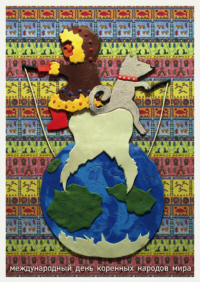 nternational
Day of the World's Indigenous People is commemorated each year on 9 August.
This holiday was established in 1994 by the UN General Assembly in order to draw
attention to the rights of indigenous peoples to maintain
and strengthen their own cultures and traditions, and to pursue their
development in accordance with their own needs and aspirations. nternational
Day of the World's Indigenous People is commemorated each year on 9 August.
This holiday was established in 1994 by the UN General Assembly in order to draw
attention to the rights of indigenous peoples to maintain
and strengthen their own cultures and traditions, and to pursue their
development in accordance with their own needs and aspirations.
In the Russian Federation
this day has been widely adopted and is actively celebrated every year,
especially in the Northern regions – in an informal way, attracting many
people. This year there were mass celebrations in Murmansk
region, Primorie territory, in Kamchatka and
Taimyr, and in many other regions.
Indigenous languages
serve to transmit cultural systems and express world views, identities and
specific characteristics of entire communities. In addition, they convey
irreplaceable traditions and knowledge. However, their survival is coming under
increasing pressure in the twenty-first century owing to various processes
linked to modern lifestyles as well as insufficient support for their
protection and promotion. Experts tell us that more than half of all languages
are endangered in today’s increasingly globalized world.
This holiday
is a special day for our Institute too because we work especially for the indigenous
peoples of Russia,
and among our co-workers there are many representatives of them. Our editions
in Dolgan, Koryak, Nanai, Nganasan, Nenets, Chukchi, Evenki, Even, and many
other languages are a gift to these peoples. Basing our work on their language
and spiritual heritage, we make our own impact on the revival and development
of their languages and spiritual life. Bible translation opens up new horizons:
it raises the functional status of a language, develops its grammar structure
and enriches its vocabulary; it offers the opportunity to use Bible
translations in education for teaching the language and literature; it provides
opportunities for academic studies and research; it raises the status of the
mother tongue; and it deepens and enhances the people’s cultural wealth.
We
congratulate our colleagues in the translation projects on this holiday and
wish them positive changes in their lives and achieving the desired results!
IBT Moscow co-workers
09.07.09
I The
Head of the Department for External Church Relations of the
Moscow Patriarchate, Archbishop Ilarion of Volokolamsk, received
a delegation from the Institute for Bible Translation
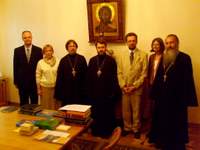 On 9 July
the leadership and some co-workers of the Institute for Bible Translation met
with the Head of the Department for External Church Relations of the Moscow
Patriarchate, Archbishop Ilarion of Volokolamsk. The following people took part
in the meeting: executive secretary of the Patriarchal Synodal Bible Commission
and director of the Synodal Library Archpriest Boris Danilenko, chief
bibliographer of the Synodal Library and chairman of IBT Board Archpriest
Alexander Troitskiy, director of the Institute for Bible translation Marianne
Beerle-Moor, IBT deputy director N. Gorbunova, IBT consultant A. Desnitskiy and
IBT exegetical adviser A. Somov. On 9 July
the leadership and some co-workers of the Institute for Bible Translation met
with the Head of the Department for External Church Relations of the Moscow
Patriarchate, Archbishop Ilarion of Volokolamsk. The following people took part
in the meeting: executive secretary of the Patriarchal Synodal Bible Commission
and director of the Synodal Library Archpriest Boris Danilenko, chief
bibliographer of the Synodal Library and chairman of IBT Board Archpriest
Alexander Troitskiy, director of the Institute for Bible translation Marianne
Beerle-Moor, IBT deputy director N. Gorbunova, IBT consultant A. Desnitskiy and
IBT exegetical adviser A. Somov.
During the
talks the results of and plans for IBT activity were discussed. The Institute
is a non-denominational organization founded in Stockholm in 1973. The Russian
organization, the Institute for Bible Translation, was registered in Moscow
almost 15 years ago. It has been located in Moscow on the territory of the Patriarchal
Metochion in the former St. Andrew’s Monastery. It works in close cooperation
with the Patriarchal Synodal Bible Commission of the Russian Orthodox Church.
The Institute is implementing numerous Bible translation and publishing
projects in 65 languages of the non-Slavic peoples of Russia and other CIS
countries. In this time IBT has developed a relationship of cooperation with
many dioceses and synodal departments of the Russian Orthodox Church.
Communication
service of the
Department of External Church Relations of the ROC
03.07.09
I Multimedia
project “Stories about Jesus Christ”
 Stories
about Jesus Christ is
the New Testament part of The Institute for Bible Translation's
popular book The Bible for Children. It is a collection
of retold Bible stories and direct quotations from the Bible. Stories
about Jesus Christ is
the New Testament part of The Institute for Bible Translation's
popular book The Bible for Children. It is a collection
of retold Bible stories and direct quotations from the Bible.
Stories about
Jesus Christ was first published in Russian, then
translated into Kurmanji, Crimean Tatar, Karakalpak, Nenets and a number of
other languages. In some of the publications, illustrations by local artists
were used. In 2002, the book was translated into Georgian by Roin Kondzhariy
and published with illustrations by David Popiashvili.
David Popiashvili created more
than 30 complete paintings, reflecting the earthly life of Jesus Christ. The
book became popular not only among the Georgian readers, but also among
Russians and Europeans. The main concept of the project was to see the
illustrations and the text as a whole, so for those who did not understand the
Georgian text, one dimension was lost.
Thus, an idea was born to
publish the text parallelly in three languages: Georgian, Russian and English.
The English translation was made by Anna-Lena Hansson.
Modern
information technology gives room for creative fantasies
and one more aspect was added to the initial idea —
to make audio recordings of the texts. It is now possible
not only to enjoy the pictures and read the text in English,
Georgian and Russian, but you can also listen to text in
the different languages.
01.07.09
I Forum
of Bible Agencies International Launched "Find
A Bible" Website
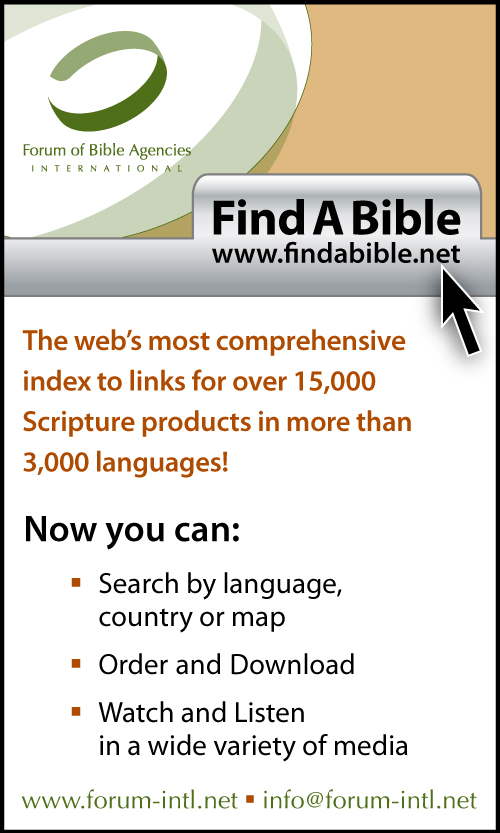 The Forum of Bible Agencies International (FOBAI) launched FindABible.net, The Forum of Bible Agencies International (FOBAI) launched FindABible.net,
an
innovative and interactive website that gives easy access
to 15,000 Scripture products in more than 2,000 languages.
The FindABible.net site provides the most comprehensive
and current database of Bibles and portions in majority
and minority languages available. Many Scripture products
noted on the site have never before been listed on the web.
Through FindABible.net, users now have a single place to
search, download, view, or listen to these Bibles through
links to Forum member agency websites.
Prior to the release of FindABible.net, people wishing
to find Scripture in a particular language had to browse through a variety of
web sites that offered a limited number of Scripture products for purchase or
online viewing. Users had to guess which agency might have the product, then
contact them to find out if it even existed and how to obtain a copy.
Now, through FindABible.net, with just the name of a language and a click of
the mouse, links to Scripture products are within reach.
In addition, the global community is growing ever more
dependent on the Internet. If a web search for a Bible in a given
language turns up nothing, or turns up a translation but offers no way to
obtain it, people will assume it does not exist, and give up trying. Recognizing
this gap, and utilizing the latest technology, the Forum mounted an
unprecedented data collection effort and built a website that opens up a new
wealth of information to the general public.
FindABible.net
29.06.09
I
The
Gospel of Luke, Ruth and Jonah published in the Kabardian
language
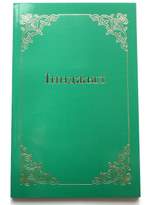 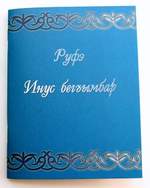 The
Kabardians (520,000) live in the Kabardino-Balkar
Republic
of the Russian
Federation in
the northern part of the Caucasus. The
Kabardians (520,000) live in the Kabardino-Balkar
Republic
of the Russian
Federation in
the northern part of the Caucasus.
The New Testament in Kabardian was published by IBT in 1993
and has been widely used. A slight revision of the text was published in 2007.
The believers felt a need to make the NT text more understandable. Therefore
IBT initiated a thorough revision of the Gospel of Luke into a more comprehensive
style. This new edition has now been printed in 1,500 copies.
Translation
of portions of the Old Testament into Kabardian is also
in progress. This text will be important for the Kabardians
as they will find many similarities with their own traditions
there. A book containing Ruth and Jonah has been
published in 1,500 copies.
The
first copies of both these editions were delivered to IBT
Moscow at the end of June.
27.04.09
I The
Children's
Bible in Lezgi
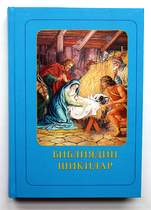 In April 2009 IBT Russia/CIS
published the Children's Bible in the Lezgi language. So far this book has been
translated into 39 languages (35 of them in the former Soviet Union). This is the first translation
of it into one of the many languages spoken in the North Caucasian republic of Dagestan by the Caspian Sea in
southern Russia. In April 2009 IBT Russia/CIS
published the Children's Bible in the Lezgi language. So far this book has been
translated into 39 languages (35 of them in the former Soviet Union). This is the first translation
of it into one of the many languages spoken in the North Caucasian republic of Dagestan by the Caspian Sea in
southern Russia.
The
500,000 Lezgins are the second largest people group in Dagestan.
About half of them live
in the neighbouring republic
of Azerbaijan. The translation
was made in the
literary
Lezgi language, which is based on one of the dialects spoken
in Dagestan.
However, the translation has been
made in such a way that the text will be understood also
by speakers of other dialects, even when they don't have
contact with the standard dialect or have been able to learn
the literary language at school.
The Children's Bible contains
the most important biblical stories from the creation of the world to
Revelation. The book first appeared in Russian 25 years ago, and for many
people it has been the first step in getting to know the Holy Scriptures. Each
story is illustrated in colour. At the end of the book there are maps and
photographs of biblical places. The first page of the book has a greeting from
the former Patriarch of Moscow and All Russia, Alexei II, who died earlier this
year. A Lezgi woman, working as a teacher in one of the schools in Makhachkala,
has been using the Russian Children's Bible in her teaching and has found it to
be an excellent school book.
The
comparatively small first edition of 2,000 copies will reach
Makhachkala,
the capital of Dagestan,
in the next few days. There the books will be distributed
to churches, libraries and schools so that as many children
and adults as possible will become familiar with this beautiful
book and its message.
26.03.09
I Genesis
and Proverbs published in Kumyk
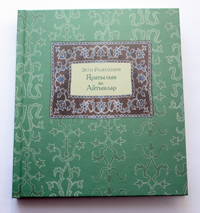 The first copies of a book containing Genesis and
Proverbs in Kumyk arrived from the printing house on 26 March. Kumyk is a
Turkic language, spoken by about 423,000 in Dagestan on the western shore of the
Caspian Sea in southern Russia.
The Kumyks received their first New Testament in March 2007, and Genesis and
Proverbs are the first Old Testament books ever published in the
Kumyk language. Work on the Psalms is in progress. The first copies of a book containing Genesis and
Proverbs in Kumyk arrived from the printing house on 26 March. Kumyk is a
Turkic language, spoken by about 423,000 in Dagestan on the western shore of the
Caspian Sea in southern Russia.
The Kumyks received their first New Testament in March 2007, and Genesis and
Proverbs are the first Old Testament books ever published in the
Kumyk language. Work on the Psalms is in progress.
“I praise the Lord that some of the Old Testament is
being translated into my language – I have long been praying for this,” said a
Kumyk woman who visited IBT some months ago.
22.01.09
I
The Children's Bible published in Tatar
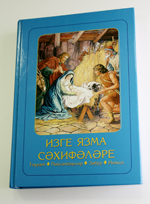 IBT's
Children's Bible has now been published in 36 languages, most of them spoken in
Russia
and other CIS countries. The latest version is in Tatar, printed in Kazan in January 2009 and
called “Pages from the Holy Scriptures”. On the cover of the book the different
parts of the Bible are indicated: Pentateuch, Psalms, Prophets and New
Testament, in order to show the reader which Holy Scriptures it concerns. IBT's
Children's Bible has now been published in 36 languages, most of them spoken in
Russia
and other CIS countries. The latest version is in Tatar, printed in Kazan in January 2009 and
called “Pages from the Holy Scriptures”. On the cover of the book the different
parts of the Bible are indicated: Pentateuch, Psalms, Prophets and New
Testament, in order to show the reader which Holy Scriptures it concerns.
Since
other books printed in Tatar for children were distributed very
quickly, we believe that this new book also will be sought-after.
3,500 copies have been printed. The Children's Bibles will
be distributed by the churches, and some of the books have
already been delivered to all the libraries and prisons
in Tatarstan.
The
translation work on the Tatar Bible is continuing. Besides
the Injil (New Testament), and the Taurat
(Pentateuch), published by IBT in 2001 and 2007, the whole
Bible will be ready for printing within a couple of years.
15.01.09
I New
edition of the New Testament in Yakut
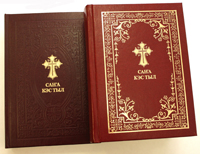 On
the request of many readers and churches in Yakutia IBT
has published a new edition of the New Testament in the
Yakut language. The 10,000 copies of the first edition,
published in 2004, were not enough for the half million
Yakuts. The books were quickly distributed and are now actively
used not
only in home reading but also in the churches of Yakutia.
Therefore
another 8,000 copies were printed and the books
arrived in Yakutia
just in time for the New Year. The
books were published with two different covers.
On
the request of many readers and churches in Yakutia IBT
has published a new edition of the New Testament in the
Yakut language. The 10,000 copies of the first edition,
published in 2004, were not enough for the half million
Yakuts. The books were quickly distributed and are now actively
used not
only in home reading but also in the churches of Yakutia.
Therefore
another 8,000 copies were printed and the books
arrived in Yakutia
just in time for the New Year. The
books were published with two different covers.
Since
the publication of the first edition of the Yakut NT the
translation team has continued working on the book of Psalms.
IBT is planning to publish this significant Bible book by
the end of 2009.
|

 On
18 December 2009 a Round Table discussion took place at
the Chuvash Institute of Human Sciences in Cheboksary, capital
of Chuvashia. Participants included Chuvash writers, linguists,
journalists and historians and the topic was the New Testament
in modern Chuvash, just published by the Institute for Bible
Translation. The edition bears the imprint of the Russian
Academy of Sciences, which is a guarantee that the translation
is of good quality.
On
18 December 2009 a Round Table discussion took place at
the Chuvash Institute of Human Sciences in Cheboksary, capital
of Chuvashia. Participants included Chuvash writers, linguists,
journalists and historians and the topic was the New Testament
in modern Chuvash, just published by the Institute for Bible
Translation. The edition bears the imprint of the Russian
Academy of Sciences, which is a guarantee that the translation
is of good quality. A
second improved and enlarged version of the Short Dungan-Russian
dictionary has been published with the participation and
assistance of the Institute for Bible Translation in Moscow.
The original dictionary was compiled by Yusup Yanshansin,
whose 100th birthday was recently celebrated in Bishkek.
The Short Dungan-Russian dictionary was the first example
of a bilingual dictionary for the Dungan language. The material
was taken from spoken and written sources, collected by
Yanshansin over many years.
A
second improved and enlarged version of the Short Dungan-Russian
dictionary has been published with the participation and
assistance of the Institute for Bible Translation in Moscow.
The original dictionary was compiled by Yusup Yanshansin,
whose 100th birthday was recently celebrated in Bishkek.
The Short Dungan-Russian dictionary was the first example
of a bilingual dictionary for the Dungan language. The material
was taken from spoken and written sources, collected by
Yanshansin over many years. The
New Testament was first translated into Chuvash by I. Yakovlev
and published as early as 1911. This translation is still
used by the Orthodox church. In addition to this, IBT has
now published a translation of the New Testament in modern
Chuvash, mainly intended for home reading. The book contains
a glossary of key terms, maps and photographs of biblical
places. The publication bears the imprint of the Institute
of Linguistics of the Russian Academy of Sciences.
The
New Testament was first translated into Chuvash by I. Yakovlev
and published as early as 1911. This translation is still
used by the Orthodox church. In addition to this, IBT has
now published a translation of the New Testament in modern
Chuvash, mainly intended for home reading. The book contains
a glossary of key terms, maps and photographs of biblical
places. The publication bears the imprint of the Institute
of Linguistics of the Russian Academy of Sciences. IBT's
annual International Fellowship weekend took place 21-24
November 2009 in Moscow. The event began on 21 November
with the traditional “Open Day”, when all the co-workers
of IBT Russia/CIS met with those who support their work.
This time we had the joy of welcoming representatives of
organisations from Denmark, Norway, England, Switzerland
and USA. We were also happy to have team members from the
Ossetic and Bashkir
IBT's
annual International Fellowship weekend took place 21-24
November 2009 in Moscow. The event began on 21 November
with the traditional “Open Day”, when all the co-workers
of IBT Russia/CIS met with those who support their work.
This time we had the joy of welcoming representatives of
organisations from Denmark, Norway, England, Switzerland
and USA. We were also happy to have team members from the
Ossetic and Bashkir  projects
present. With the goal of bringing the organisations into
closer contact with each other and with IBT Russia/CIS,
an International Association was formed and had its first
meeting on 22 November.
projects
present. With the goal of bringing the organisations into
closer contact with each other and with IBT Russia/CIS,
an International Association was formed and had its first
meeting on 22 November.  “Forever
together” is the inscription on the medal which IBT Russia/CIS
received on 16 November 2009 from the Kalmyk republic. The
words refer to the 400 years that the Kalmyk people have
lived in the Russian Federation, a jubilee which was celebrated
widely in Kalmykia during 2009. On the 16th-18th November
the anniversary celebrations moved to Moscow, where 400
Kalmyk artists and authors participated in concerts, exhibitions
and meetings with their Russian colleagues.
“Forever
together” is the inscription on the medal which IBT Russia/CIS
received on 16 November 2009 from the Kalmyk republic. The
words refer to the 400 years that the Kalmyk people have
lived in the Russian Federation, a jubilee which was celebrated
widely in Kalmykia during 2009. On the 16th-18th November
the anniversary celebrations moved to Moscow, where 400
Kalmyk artists and authors participated in concerts, exhibitions
and meetings with their Russian colleagues. From 30 September to 6
October IBT held a training course for new team members: translators,
philological editors, exegetical advisors and field testers. All the
participants were professionals and specialists in their languages: Andi,
Dargin, Mari, Kumyk, Komi-Permyak, Kabardian, Lezgi and Tatar. Soon they will
be able to put into practice what they learnt in the field of Bible
translation.
From 30 September to 6
October IBT held a training course for new team members: translators,
philological editors, exegetical advisors and field testers. All the
participants were professionals and specialists in their languages: Andi,
Dargin, Mari, Kumyk, Komi-Permyak, Kabardian, Lezgi and Tatar. Soon they will
be able to put into practice what they learnt in the field of Bible
translation. In
September 2009 IBT published ”Tevrat” in Crimean Tatar, an edition containing
three of the five books of Moses: Genesis, Exodus and Deuteronomy. At the
request of readers it was decided to publish these three books now, and not
wait for Leviticus and Numbers, which are in the process of being translated.
In
September 2009 IBT published ”Tevrat” in Crimean Tatar, an edition containing
three of the five books of Moses: Genesis, Exodus and Deuteronomy. At the
request of readers it was decided to publish these three books now, and not
wait for Leviticus and Numbers, which are in the process of being translated. The Adygei (129,000) live in the Adygei
Republic of the Russian Federation, north-western Caucasus. They are mainly Sunni Muslims.
The Adygei (129,000) live in the Adygei
Republic of the Russian Federation, north-western Caucasus. They are mainly Sunni Muslims. IBT has published
a new edition that includes the translation of Ruth, Esther and Jonah in the
Kurdish language. These translations come within the framework of preparations
to publish the complete Old Testament. The present edition will be distributed among
the Kurdish diaspora in Nizhniy Novgorod
IBT has published
a new edition that includes the translation of Ruth, Esther and Jonah in the
Kurdish language. These translations come within the framework of preparations
to publish the complete Old Testament. The present edition will be distributed among
the Kurdish diaspora in Nizhniy Novgorod nternational
Day of the World's Indigenous People is commemorated each year on 9 August.
This holiday was established
nternational
Day of the World's Indigenous People is commemorated each year on 9 August.
This holiday was established 








Share: